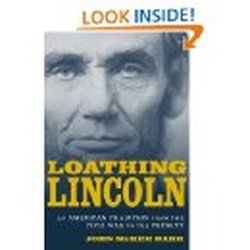
John McKee Barr
Louisiana State University Press, 2014, 472 pp., $35.95
ISBN: 978-0-8071-5383-3
Image courtesy of amazon.com
Abraham Lincoln is one of America’s most beloved presidents, or at least in this day and age. Many times, people forget how loathed Lincoln was even during the Reconstruction period and in the present day. It’s a subject we, as Civil War students and Historians, look into very little. John McKee Barr takes it upon himself to write a book which brings light to a subject we rarely look into: the people and reasoning behind the loathing of Abraham Lincoln. Throughout the narrative, the reader will get a look into the world of the people who worked to vilify and denounce America’s most beloved president. In Loathing Lincoln, some questions have been answered and the material which has been brought forth is amazing.
John McKee Barr is a professor of history at Lone Star College in Kingwood. In 2011, he was the recipient of the Hay-Nicolay Dissertation Prize by the Abraham Lincoln Association and the Abraham Lincoln Institute. He was also honored with the John King award from the University of Houston in 2010. Much of his work has centered around Lincoln’s Assassination and the overall negative feelings toward Lincoln. He teaches a variety of courses including The Emancipators: Charles Darwin, Abraham Lincoln and the Making of the Modern World.
When I first heard about Loathing Lincoln, I was intrigued. Those who have been studying the American Civil War have always been told about the wonderful life of the great emancipator and the deeds which he had accomplished. In fact, there are many who would argue that we are force fed the positive nature of Lincoln. Loathing Lincoln is one of the first books which I have read that tackles the subject of the people who did not care for the man, not only during the Civil War, but during Reconstruction all the way to the present day. John McKee Barr tackles this subject through all of the eras from 1858 all the way to 2012. In his introduction, he even states that some of Lincoln’s legacy dies down until the Roosevelt era where he is re-introduced to the American populace. Some of the most fascinating work comes in the chapter which deals with the post-World War II Civil Rights era where he highlights some of major issues with Lincoln himself. Lerone Bennet, a harsh critic of Lincoln during that era, even mentions that Lincoln was a large part of America’s racial problems. The narrative is fascinating and reads quite smoothly. Some of the writings of people who have loathed Lincoln through the years are thrilling and shocking to read.
I highly recommend this book to anyone interested in Abraham Lincoln and his effect on the Civil War. This was a book that needed to be written. The market is oversaturated with praise of the great emancipator but we never get the outlook on what Lincoln was like to the people who hated him. John McKee Barr should be praised for the work he has placed here in bringing to the forefront a subject which we most desperately needed. Lincoln was not loved by all, even to this day, and it is refreshing that we have an academic study on the mindset of those people.
 RSS Feed
RSS Feed
